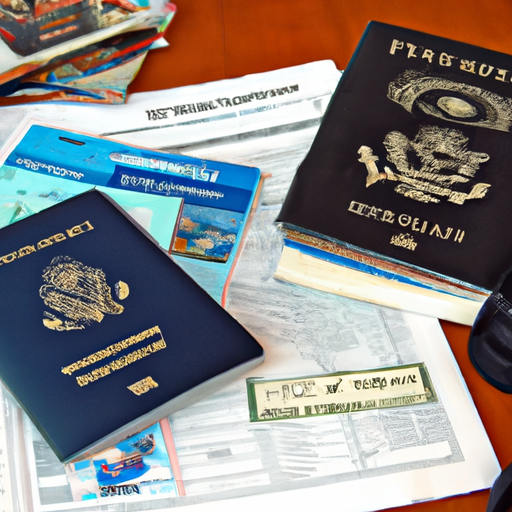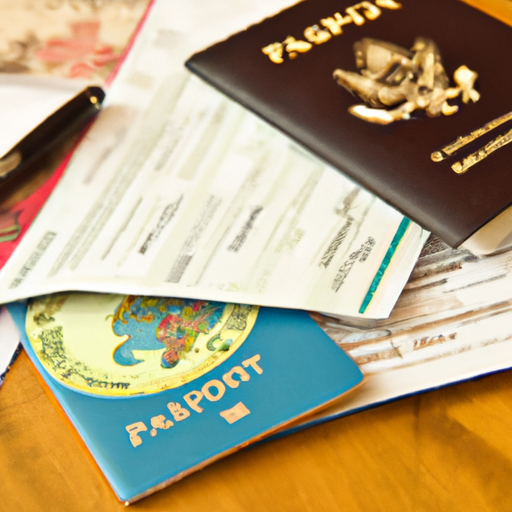In this article, we’ll discuss the essential travel documents you’ll need for your upcoming journey. From passports to visas, we’ll cover everything you need to know to ensure a smooth and hassle-free travel experience. Whether you’re planning an international trip or a domestic one, understanding the required travel documents is essential. So, let’s dive right in and find out what you need to have in your possession before embarking on your exciting adventure.
What Travel Documents Do I Need
Are you planning your next adventure abroad? Whether you’re traveling for leisure or business, it’s important to make sure you have all the necessary travel documents before your departure. In this article, we will guide you through the essential documents you will need for a hassle-free trip.
Passport
Valid Passport
The most important travel document you need is a valid passport. A passport serves as your official identification and is required for international travel. It is essential to ensure that your passport is valid for at least six months beyond your planned departure date. Many countries have this six-month validity rule to ensure that visitors do not overstay their visas.
Expiration Date
Always check your passport’s expiration date before any trip. Most countries require your passport to be valid for at least six months from the date of entry. If your passport is close to expiring, it’s best to renew it before your travels to avoid any inconveniences.
Damaged Passport
If your passport is damaged in any way, it’s advisable to replace it before your journey. A damaged passport may not be accepted by immigration officials and can cause delays or even denial of entry. Contact your country’s passport office for instructions on how to obtain a new passport if your current one is damaged.
Passport Pages
Another aspect to consider is the number of blank pages in your passport. Some countries require a certain number of blank pages for visa stamps upon entry or exit. It is recommended to have at least two to four blank pages in your passport to accommodate any required stamps.

Visa
Countries Requiring Visa
Different countries have varying visa requirements. Some destinations allow visa-free entry for certain passport holders, while others require a visa for all visitors. Before your trip, research the visa requirements for your specific destination. The embassy or consulate of the country you plan to visit can provide you with the most up-to-date information regarding visa requirements.
Visa Types
There are different types of visas depending on the purpose of your visit, such as tourist visas, business visas, or student visas. Make sure you apply for the correct visa type based on your travel plans. It’s important to note that visa applications can take time, so it’s best to apply well in advance to avoid any last-minute complications.
Visa Application Process
Each country has its own visa application process, which may include filling out an application form, providing supporting documents, paying a fee, and attending an interview. It’s crucial to follow the visa application instructions carefully and provide all the required documents to increase your chances of approval.
Visa Exemptions
Some countries have visa exemptions or visa waiver programs for specific passport holders. These programs allow travelers to enter certain countries without obtaining a visa in advance. However, it’s essential to check the length of stay permitted under these exemptions, as overstaying can have serious consequences, including a ban on future visits.
Identification
Government-issued ID
In addition to your passport, it’s wise to carry a government-issued identification card as a secondary form of identification. This can be useful in situations where you don’t want to carry your passport with you at all times. A driver’s license or a national identity card that includes your photo and personal information is usually accepted.
Driver’s License
If you plan on driving during your trip, consider obtaining an International Driving Permit (IDP). An IDP is a translation of your driver’s license and is widely accepted in many countries. It serves as an additional form of identification and allows you to legally drive in foreign destinations.
International ID Cards
Certain countries recognize international identification cards such as the International Student Identity Card (ISIC) or the International Youth Travel Card (IYTC). These cards provide discounts on various transportation, accommodation, and attractions, making them valuable additions to your travel wallet. Check if your destination accepts these cards to take advantage of the benefits they offer.

Proof of Residency
Residence Permit
If you are planning to stay in a foreign country for an extended period, you may need to obtain a residence permit or visa. Residence permits are often required for those studying or working abroad. Check with the immigration authorities of your host country to learn about the specific requirements and the application process for obtaining a residence permit.
Utility Bills
Some countries may require proof of residential address during your stay. Utility bills, such as electricity or water bills, can serve as valid proof of residency. Make sure to bring copies of these bills with you, especially if you plan to rent accommodation or need to register with local authorities.
Lease Agreement
If you have rented a long-term accommodation in your destination country, it’s advisable to carry a copy of your lease agreement. This document verifies your address and can be used as proof of residence if needed.
Travel Insurance
Medical Coverage
Travel insurance is a crucial document to have before embarking on your journey. It provides coverage for unexpected medical expenses, emergency medical evacuation, and repatriation. Make sure your travel insurance policy has sufficient medical coverage to protect you in case of illness or injury while abroad.
Lost Luggage
Travel insurance also offers protection against lost, stolen, or damaged luggage. This coverage can reimburse you for the cost of replacing essential items if your luggage is lost in transit or stolen during your trip.
Trip Cancellation
In the event of unforeseen circumstances that force you to cancel or interrupt your trip, travel insurance can provide reimbursement for non-refundable expenses such as flights, accommodations, and tours. This coverage offers peace of mind, knowing that you won’t suffer financial loss if your plans change unexpectedly.
Special Permits
Work Permit
If you are planning to work while abroad, you will likely need a work permit. A work permit authorizes you to work legally in a foreign country and is usually obtained through your employer. Make sure to research the specific work permit requirements for your destination and secure the necessary documentation before starting your new job.
Student Visa
If you’re going to study abroad, a student visa is typically required. This visa allows you to pursue academic studies in a foreign country and may have specific conditions, such as limitations on working hours or enrolling in educational institutions. Contact the educational institution or the embassy of the country you plan to study in for detailed information on student visa requirements.
Medical Visa
In the case of medical treatments or procedures abroad, you may need a medical visa. A medical visa allows you to visit a foreign country for medical purposes, including consultations, surgeries, or specialized treatments. Each country has its own specific requirements for medical visas, so consult the consulate or embassy of your destination country for guidance.
Immunization Records
Required Vaccinations
Some countries require proof of specific vaccinations before allowing entry. Common vaccinations include those for yellow fever, typhoid, or hepatitis. It’s important to consult a healthcare professional or visit a travel clinic to determine which vaccinations are recommended or required for your destination well in advance of your trip. Keep your immunization records handy to present them if requested at immigration.
International Certificate of Vaccination
Obtaining an International Certificate of Vaccination, also known as the Yellow Card, can be useful when traveling to countries that have specific vaccination requirements. This document acts as proof of immunizations received and is internationally recognized. It is especially important for destinations where yellow fever vaccination is mandatory.
Itinerary
Flight Tickets
Before traveling, make sure to have a copy of your flight tickets or e-ticket confirmation. These documents serve as proof of travel and may be required for check-in, visa applications, or immigration purposes.
Hotel Reservations
Print or save copies of your hotel reservations, including confirmation numbers and contact information. These documents may be requested upon arrival in your destination country or during the visa application process.
Travel Schedule
Creating a detailed travel schedule can be helpful, especially if you plan on visiting multiple destinations within a single trip. This document provides a comprehensive overview of your itinerary, including dates, flight details, accommodation information, and activities planned. Having a well-organized travel schedule can assist you in managing your time efficiently and ensuring you don’t miss any important reservations or appointments.
Currency
Local Currency
When traveling to a foreign country, it’s important to have the local currency on hand. Exchange a sufficient amount of your home currency for the local currency before your departure. This will ensure you have cash for immediate expenses upon arrival, such as transportation, meals, or small purchases.
Foreign Exchange
If you need to exchange currency during your trip, it’s best to do so at reputable banks or authorized currency exchange offices. Avoid exchanging money at airports or street vendors, as their rates are often unfavorable. Research the current exchange rates and compare them with different providers to get the best value for your money.
Credit Cards
Carrying a credit card is recommended for convenience, security, and flexibility. Credit cards are widely accepted in most countries and provide an easy way to pay for expenses. Make sure to inform your credit card company of your travel plans to avoid any unexpected holds or declines on your card while abroad.
Conclusion
Being prepared with the required travel documents is essential for a smooth and stress-free journey. From a valid passport and necessary visas to travel insurance and immunization records, ensure you have all the necessary documents in order. Properly organizing and securing your travel documents will ensure that you can fully enjoy your trip and make lasting memories without any unnecessary complications. Safe travels!

